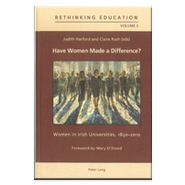Posted 26 May 2010
Mary Kate O’Kelly – Taking education out of the attic to the national stage
She may have been married to the President of Ireland but like her contemporary Sinead DeValera, Mary Kate O’Kelly was a trail-blazing woman who pursued a successful career against the odds. In 1925, the year of the public service ban excluding women from the workforce, Mary Kate was rewarded for her lifelong efforts and appointed to the new statutory lectureship in French at UCD. In a new book Have Women Made A Difference? (edited by Dr Judith Harford, UCD School of Education and Dr Claire Rush, Queen's University Belfast), leading scholars from the fields of education, literature, nursing, social policy and women’s studies trace the evolution of the role of women in university education including Mary Kate’s contribution to UCD.
At a time when women could sit exams but not attend lectures, Mary Kate defied the odds stacked against her as a woman in pursuit of education. In her chapter entitled ‘Assistant Something-or-Other in the New University: Life and Letters of Mary Kate O’Kelly’, Dr Phyllis Gaffney, UCD School of Languages & Literatures, looks at the journey O’Kelly undertook in education and her role at UCD.
To counter the aforementioned academic exclusion of the era, women’s colleges were set up from the late 1850s and since 1879 Loreto College in Stephen’s Green had the role of preparing women for the Royal University exams. Mary Kate, along with her sister Jo, attended. Six years before the introduction of the Universities Act which gave women and men an equal footing in education, Mary Kate O’Kelly graduated from Loreto College with a First Class Honours degree. The religious orders at Loreto encouraged the girls to go abroad to teach and pick up language training, thereby turning the onesidedness of the education system into an opportunity. Mary Kate and her sisters were no exception and, using the BA as a springboard, they taught in various European destinations in an era where travel wasn’t on the radar for most Irish people.
Almost a hundred years later, the themes of the Ryan daughters’ letters as they encountered the many obstacles in their path still resonate with students today – they talk of being uprooted from home, lacking money, the workload and lack of time to get anything done and loneliness. Still, they persevered. However, life wasn’t all doom and gloom – Mary Kate’s new networks through education opened not only books but also social doors for her and new pursuits included the theatre, concerts and galleries. She crossed paths with great thinkers and political leaders.
With her BA under her belt, in 1902 Mary Kate went on to Cambridge to train to be a teacher. The gendered divide she had experienced in Ireland continued in England and at Cambridge women could attend lectures and sit exams but were ineligible for degrees until 1948. The lower priority placed upon female education is reflected in the fact lectures for women were often held in attics. Regardless of the educational hierarchy, the training college in Cambridge had an excellent track record for securing employment for its graduates. This proved true for Mary Kate when she landed teaching positions in Scotland and England.
Although she learned a lot from her experiences abroad, it wasn’t long before Mary Kate returned to her native Ireland and in 1910 took up a role as Assistant in French at Ireland’s new National University. Throughout 1913, her commitment to her duties in the French Department was pushed to the limit when the Department Head, Professor Cadic, fell seriously ill and died the following year. As the war was just taking off it became impossible to find a replacement. Juggling the intensive workload, Mary Kate unofficially stepped into his shoes and for five years came to grips with the complex challenges thrown at her to make the department tick over seamlessly. In her private life, Mary Kate married a prominent member of her social circle, Sean T. O’Kelly, General Secretary of the Gaelic League and later second President of Ireland and co-founder of Fianna Fail, in April 1918. For the next sixteen years she was recognised as being a pillar of support for him during the most challenging years of Irish history. When Mary Kate O’Kelly (nee Ryan) died in 1934, two women held senior posts at UCD, illustrating the slow but changing environment for females working in education.
In the history books, Mary Kate O’Kelly (nee Ryan) tends to be overshadowed by the well-known figure of her husband but as the first female lecturer at UCD’s French Department when education was just opening up to women, her legacy in her own right is one we can learn from. Mary Kate helped turn the tide in education for women in this country, particularly within academia, and exemplified how life-changing an education can be.
Have Women Made A Difference?, edited by Dr Judith Harford and Dr Claire Rush is published by Peter Lang and is available to buy at www.peterlang.com.
The Mary Kate O'Kelly Scholarship
In accordance with the wishes of the late Sean T. O Ceallaigh, the Mary Kate O'Kelly Scholarship in the UCD School of Languages and Literatures was set up to enable graduates to proceed to PhD study. In keeping with Mary Kate’s devotion to the French Department at UCD, candidates must be a graduate of French.
(Produced by UCD University Relations)

